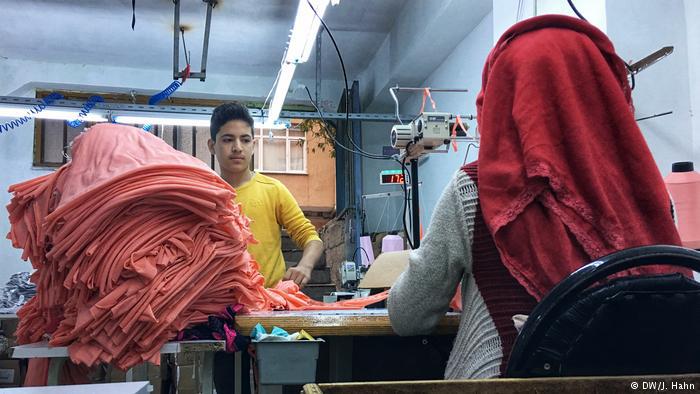Small hands, big profits: Syrian child labour in Turkey
Hard work instead of study: in Turkey there are thousands of Syrian refugee children who arenʹt going to school. Many of them work 12-hour days, even though child labour is banned. A visit to a tailorʹs workshop in Istanbul.
Work piling up: Khalil (see picture above) is 13 years old and comes from Damascus. He works five days a week in this tailorʹs workshop in the basement of a residential house in the working-class Istanbul district of Bagcilar. In this area there are sewing rooms like this one in almost every street. And there are almost always children like Khalil working in them
–

Child colleagues: the sewing machines rattle practically non-stop. Four of the 15 or so people working in this tailorʹs shop are children, all from Syria. The Turkish textile industry is one of the trades in which a lot of people work illegally. Many are underage children who are taken on as cheap labour, with no papers and no social security
–

Yearning for school: “I donʹt think about the future,” says 13-year-old Khalil, who is sorting bits of cotton fabric. A young woman is sewing them into womenʹs panties. Sorting, cutting, sewing – the two are a practiced team. Back home in Syria, Khalil was in third grade; then the war came, they fled, and he hasnʹt been back to school since
–

Exploiting or helping? Child labour is forbidden in Turkey. Anyone who employs children under the age of 15 is open to prosecution. The owner of this tailorʹs shop knows this, which is why he wants to remain anonymous. “I give the children work so they donʹt have to beg. I know itʹs forbidden, but on the other hand Iʹm helping families that wouldnʹt have enough to survive on otherwise,” he says
–

“I hope I can go home”: Musa is also 13. Like many people in this tailorʹs workshop, he comes from the province of Afrin in northern Syria, which has a majority Kurdish population. What does he do when heʹs not working? “Play football,” he says. “I hope there will soon be peace in Syria and weʹll be able to go back home. Then I want to study there and become a doctor”
–

As long as itʹs cheap: thousands of womenʹs panties are sewn and packed here every day, in various colours, patterns and sizes. Theyʹre sold in bazaars for a few Turkish lira apiece. The aim is to undercut the Chinese competition. The children here are paid a rate of less than 50 euro cents an hour. Adults earn about twice that
–

A 12-hour day: Aras is 11 and has been working here for four months. Her mother is pregnant; her father has a job of his own in a textile factory. Arasʹ day begins at 8 a.m. and often doesnʹt finish until 8 p.m. Sheʹs allowed two breaks a day. Aras earns 700 Turkish lira a month – around 153 euros
–

Studying is a luxury: because she works Monday to Friday, Aras canʹt go to a regular state school. She attends classes at a Syrian aid organisation at the weekend, so that at least sheʹs learning something. Maths, Arabic and Turkish are on the curriculum. The teachers themselves are refugees from the war in Syria
–

Lessons are time out: more than 70 children aged between four and 18 attend the little Syrian school each day. Sometimes the teachers visit families at home and persuade the parents to send their children to lessons, at least a few days a week, to give them a stab at a better future, and to give them a chance – for a while – to be what they are: children
Author: Julia Hahn







